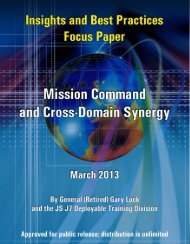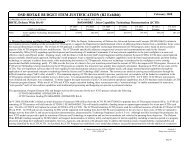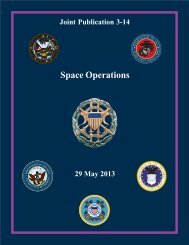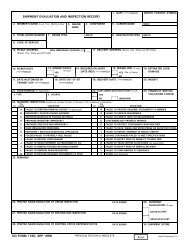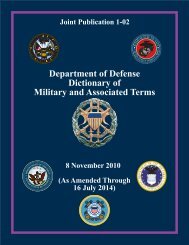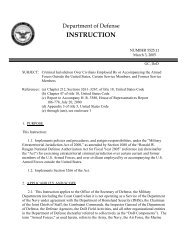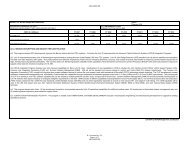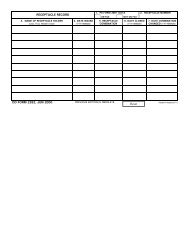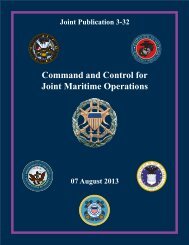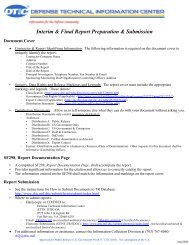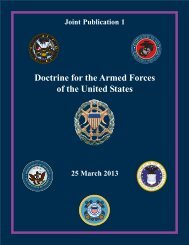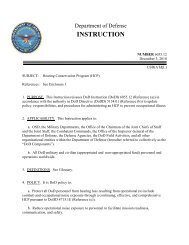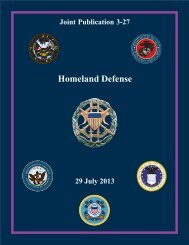JP 3-16, Multinational Operations - Defense Technical Information ...
JP 3-16, Multinational Operations - Defense Technical Information ...
JP 3-16, Multinational Operations - Defense Technical Information ...
You also want an ePaper? Increase the reach of your titles
YUMPU automatically turns print PDFs into web optimized ePapers that Google loves.
Chapter III<br />
the MNTF.<br />
(a) Facilitate coordination and identification of resources for potential use by<br />
(b) Provide interpretation and translation services to the HNSCC staff.<br />
(2) <strong>Information</strong> Requirements. In order to effectively plan and coordinate HNS<br />
allocation, the HNSCC needs up-to-date information on HNS logistic capabilities and<br />
ongoing HNS allocation to MNTF contingents throughout the operation. To ensure that it<br />
receives such information, the HNSCC must maintain close contact with the HN and with<br />
MNTF contingents.<br />
(3) Coordinating Activities. In conducting its operations, the HNSCC coordinates<br />
closely with appropriate CMOC organizations, the multinational joint logistics center, and<br />
the HN’s representatives.<br />
e. HNS is generally furnished IAW an agreement negotiated prior to the start of an<br />
operation. HNS agreements are commonly established through diplomatic channels in<br />
bilateral and multilateral agreements with the HN. These are normally umbrella-type<br />
agreements that are augmented to support contingencies by TAs detailing the specific<br />
support to be provided and the type/amount of reimbursement.<br />
f. During crises, it may be necessary for the US GCC to request authority to negotiate<br />
bilateral HNS agreements for the purpose of providing logistic assistance to other nations.<br />
Such negotiations are conducted in coordination with the Joint Staff, the Office of the<br />
Secretary of <strong>Defense</strong>, and DOS, and in compliance with applicable DODDs. Alternatively,<br />
the MNFC may be authorized to negotiate HNS agreements on behalf of force contributing<br />
nations, with their prior concurrence. This approach, which NATO doctrine endorses,<br />
simplifies and streamlines the process and reduces the amount of time required to put such<br />
agreements into place.<br />
g. Available HNS Infrastructure. Analysis of the physical infrastructure in the HN is<br />
critical to understanding force sustainability. MNTF logistic planners should evaluate what<br />
facilities and services (such as government, law enforcement, sanitation, power, fuel, and<br />
medical support) exist as viable support for local consumption and support of coalition<br />
forces.<br />
(1) First, assess the ability of the HN to receive MNTF personnel and equipment<br />
(e.g., ports and airfields).<br />
(2) Second, determine the capability of transportation systems to move forces once<br />
they arrive in theater.<br />
(3) Third, evaluate availability of logistic support.<br />
(4) The impact of obtaining HNS on the host country’s national economy must also<br />
be considered, along with possible environmental impacts upon HNs. These must be<br />
recognized and addressed during the planning process.<br />
III-44 <strong>JP</strong> 3-<strong>16</strong>



